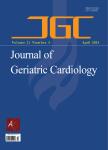Impact of age on long term survival following transcatheter aortic valve implantation
Impact of age on long term survival following transcatheter aortic valve implantation作者机构:Department of Cardiology Bezmialem Vakif University
出 版 物:《Journal of Geriatric Cardiology》 (老年心脏病学杂志(英文版))
年 卷 期:2019年第16卷第3期
页 面:265-271页
核心收录:
学科分类:10[医学]
主 题:Aortic stenosis Clinical outcome Non-surgical management Octogenarian The elderly
摘 要:Objective To compare the long-term survival following transcatheter aortic valve implantation (TAVI) in an octogenarian population with that in a younger *** This retrospective study included 274 patients that underwent TAVI for severe symptomatic aortic *** study group was divided into two age groups,as those with an age ≥ 80 years (octogenarians,n = 132),and age 80 (younger patients,n = 142).The two groups were compared in terms of clinical outcomes and *** addition,significant predictors of survival were *** Non-cardiac mortality (during follow-up)(21.9% vs.10.5%,P = 0.01) and in-hospital stroke (8.3% vs.2.8%,P = 0.01) were more common among *** two groups did not differ in terms of mean survival (41.0 ± 2.1 vs.38.2 ± 2.2 months,respectively,P =0.18).Multivariate analysis identified left ventricular ejection fraction 35%(OR: 2.17,95% CI: 1.17–4.03;P = 0.01),preoperative of moderate to severe mitral insufficiency (OR: 1.88,95% CI: 1.15–3.06;P = 0.01),postoperative major and life-threating bleeding (OR: 2.49,95% CI: 1.05–5.89;P =0.03),and in-hospital stroke (OR: 2.29,95% CI: 1.04–5.04;P = 0.03) as potential predictors of poor *** In this study,similarly favorable survival outcomes were achieved in the elderly population as in younger patients,despite the presence of comorbid conditions.A consideration should be given to non-surgical management of severe aortic stenosis with the TAVI procedure in elderly patients,in the absence of co-existent conditions associated with shortened life expectancy.



